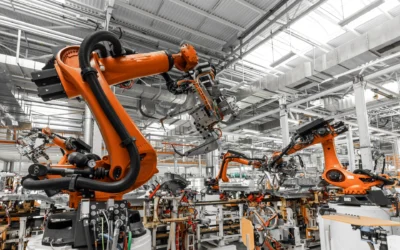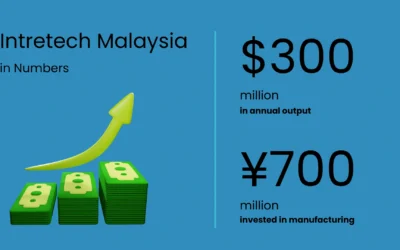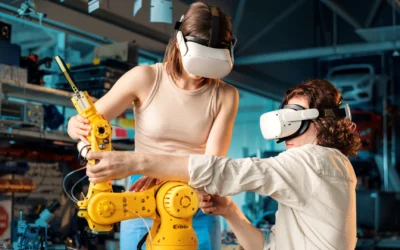How Automation and Industry 4.0 are Revolutionising PCB Manufacturing
By leveraging robotics, artificial intelligence (AI), and the Internet of Things (IoT), PCB manufacturers can drastically improve output quality while reducing costs and production times. Below we explore how automation and Industry 4.0 are revolutionising the PCB industry and why companies must embrace these innovations to stay competitive.
The Power of Automation in PCB Manufacturing
Automation in PCB manufacturing involves using robotic systems to perform tasks such as component placement, soldering, inspection, and testing. These were once manual tasks that required time, labor, and a high degree of precision, making them susceptible to human error. Automation has changed the landscape of traditional manufacturing methods.
Key Benefits of Automation:
- Enhanced Production Speed: Automated systems allow for round-the-clock production, significantly speeding up processes that previously required human intervention. For instance, pick-and-place machines can place components on PCBs at speeds of 40,000 placements per hour — a rate no human worker can match (PCBPit –). This increased speed allows us to meet growing demands without compromising quality.
- Improved Precision and Consistency: Automation reduces the variability inherent in manual production. For example, AI-powered visual inspection systems can detect microscopic defects that human inspectors might miss, improving quality control by up to 30% (Circuits-Central). This level of precision ensures that manufacturers like us, can meet stringent electronics industry standards while minimising waste and rework.
- Reduction in Human Error: Human errors, while inevitable, can be costly in PCB production, leading to faulty products and material waste. PCB Designers can automate key production processes, we can reduce the risk of errors, improving overall product reliability.
- Cost Savings: While the initial investment in automation technology is significant, the long-term savings in operational costs are substantial. Automated systems reduce reliance on manual labour, leading to savings of 25-30% in labour costs, according to a report by Deloitte (PCB Master). Additionally, the reduction in errors and defects lowers the cost of rework and scrap materials, further enhancing profitability.
Industry 4.0: The Next Level of Smart Manufacturing
Industry 4.0 goes beyond automation by integrating smart technologies like IoT, big data analytics, and AI into the manufacturing process. These technologies enable PCB manufacturers to create smart factories, where machines communicate with each other, adapt to real-time data, and continuously optimise their own performance while optimising production capacity.
Real-Time Data and Predictive Maintenance
In a traditional manufacturing setup, unexpected machinery failures can lead to costly downtime. However, with Industry 4.0, IoT sensors embedded in equipment monitor machine performance in real-time, enabling predictive maintenance. Machines can now alert operators when they need servicing, reducing unplanned downtime by up to 70%, according to McKinsey & Company (SpringerLink).
This capability is critical in PCB production, where any disruption in the manufacturing process can lead to costly delays. For example, TTM Technologies, a global leader in PCB manufacturing, has implemented IoT-based systems to monitor temperature and humidity levels in their production lines, ensuring optimal conditions and reducing the likelihood of environmental factors affecting the quality of their PCBs.
Boosting Quality with Enhanced Traceability
In many traditional manufacturing settings, tracking production units at the batch level limits the ability to thoroughly investigate quality issues. Engineers may find it difficult to pinpoint whether problems originate in front-end or back-end processes, or which specific machines or operators are involved. This approach can leave quality-control teams struggling to perform detailed analyses, making it harder to solve recurring problems efficiently.
Industry 4.0 transforms this process by enabling traceability at the individual-die level throughout production. This granular level of tracking offers a comprehensive view of the entire production chain. Take, for example, a factory experiencing die cracks. Using conventional methods, they couldn’t trace the issue’s origin. However, with Industry 4.0 tools in place, they were able to identify the exact front-end fab, as well as the machines and operators involved in producing the faulty units. By providing such precise traceability, manufacturers can not only resolve problems faster but also prevent them from recurring, leading to higher quality products and more efficient operations.
The Role of AI in Optimising Production
Artificial Intelligence (AI) plays a pivotal role in Industry 4.0 by enabling machines to learn from data and make real-time adjustments to the manufacturing process. AI systems can analyse vast amounts of data to identify patterns and predict potential bottlenecks or failures. This leads to more efficient production lines, fewer defects, and quicker turnaround times.
For example, AI-driven inspection systems can evaluate PCBs at various stages of production, flagging any potential defects before they progress through the manufacturing cycle. This real-time feedback loop not only reduces waste but also shortens the time needed for quality assurance, leading to faster delivery times for end products.
Customization and Flexibility
As consumer electronics become more personalised, the demand for customised PCB designs is on the rise. Industry 4.0 enables manufacturers to offer mass customization—the ability to produce small batches of highly tailored products without incurring the high costs typically associated with customization. This is made possible through the flexibility of automated systems and the real-time adaptability provided by Industry 4.0 technologies.
By incorporating digital twin technology, you can create virtual replicas of their production processes, allowing them to simulate and optimise different production scenarios before physical implementation. This flexibility will help switch between different product designs more efficiently, drastically reducing setup times and production costs.
Leading the Charge: Industry Examples
Several industry leaders are pioneering the integration of automation and Industry 4.0 in PCB manufacturing, setting the standard for what the future of electronics manufacturing will look like.
- Foxconn: Known for manufacturing electronics for companies like Apple, Foxconn has embraced automation to the fullest. The company has deployed robotic systems across its production lines, reducing labour by 30% while increasing production speed and quality (PCBPit). Foxconn’s investments in Industry 4.0 technologies have allowed the company to remain competitive in a fast-evolving industry.
- AT&S: A global leader in high-end PCB solutions, AT&S has integrated Industry 4.0 technologies to optimise production processes. Their smart factories leverage AI, big data, and IoT systems to monitor every aspect of production, from material sourcing to final product inspection. By embracing these technologies, AT&S has reduced production times and improved product quality, setting them apart in the global market.
- TTM Technologies: TTM has integrated IoT into its manufacturing processes, enabling real-time monitoring of environmental conditions like humidity and temperature, which are critical to ensuring high-quality PCB assembly. This level of automation and data integration has allowed TTM to enhance product consistency and reduce waste.
The Future of PCB Manufacturing: Efficiency and Innovation
As automation and Industry 4.0 continue to evolve, the future of PCB manufacturing looks promising. These technologies not only offer increased efficiency but also the flexibility needed to meet the growing demand for customised electronics. By automating repetitive tasks, reducing human error, and optimising production processes through real-time data and AI, manufacturers can produce higher-quality PCBs at a lower cost.
The adoption of these technologies is more than a competitive advantage—it’s becoming a necessity. Companies that fail to embrace automation and Industry 4.0 risk falling behind in an increasingly complex and fast-paced industry. By investing in smart manufacturing technologies, PCB manufacturers like us stay ahead of the curve, offering superior products while maintaining cost efficiency and adaptability.
At Intretech, we are committed to leveraging the latest advancements in automation and Industry 4.0 to deliver innovative, high-quality PCB solutions to our clients. As we look to the future, the integration of these technologies will continue to drive growth, efficiency, and customer satisfaction in the world of electronics manufacturing.
Ready to Enhance Your Production?
Dive deeper into how Industry 4.0 and automation can transform your production lines.
Learn more about our tailored solutions that can help you stay ahead in a competitive market.
The convergence of automation and Industry 4.0 is transforming PCB manufacturing, making it faster, more precise, and more adaptable than ever before. From reducing human error and production downtime to enabling mass customization, these technologies are reshaping the future of electronics manufacturing. Companies that embrace this revolution will not only enhance their operational efficiency but also position themselves as leaders in a rapidly evolving global market.
Explore more related content
The Innovations that Shaped Manufacturing
The Innovations that Shaped Manufacturing in 2024 Every year, different trends drive every industry, and manufacturing...
Intretech Shines at PMI Supplier Summit: A Collaborative Vision for Excellence
Intretech Shines at PMI Supplier Summit: A Collaborative Vision for ExcellenceIntretech Ltd, a forerunner in the...
How is Generative AI Shaping the Future of Manufacturing Design and Prototyping?
How is Generative AI Shaping the Future of Manufacturing Design and Prototyping?The use of artificial intelligence...







